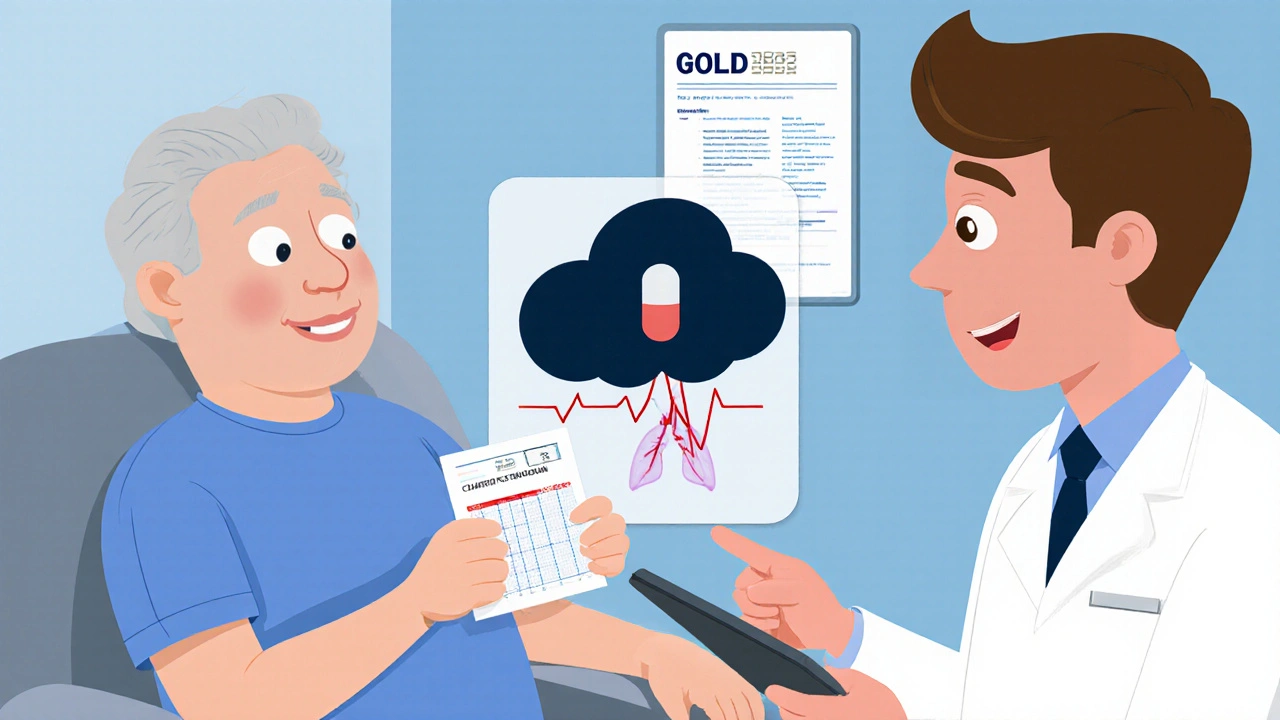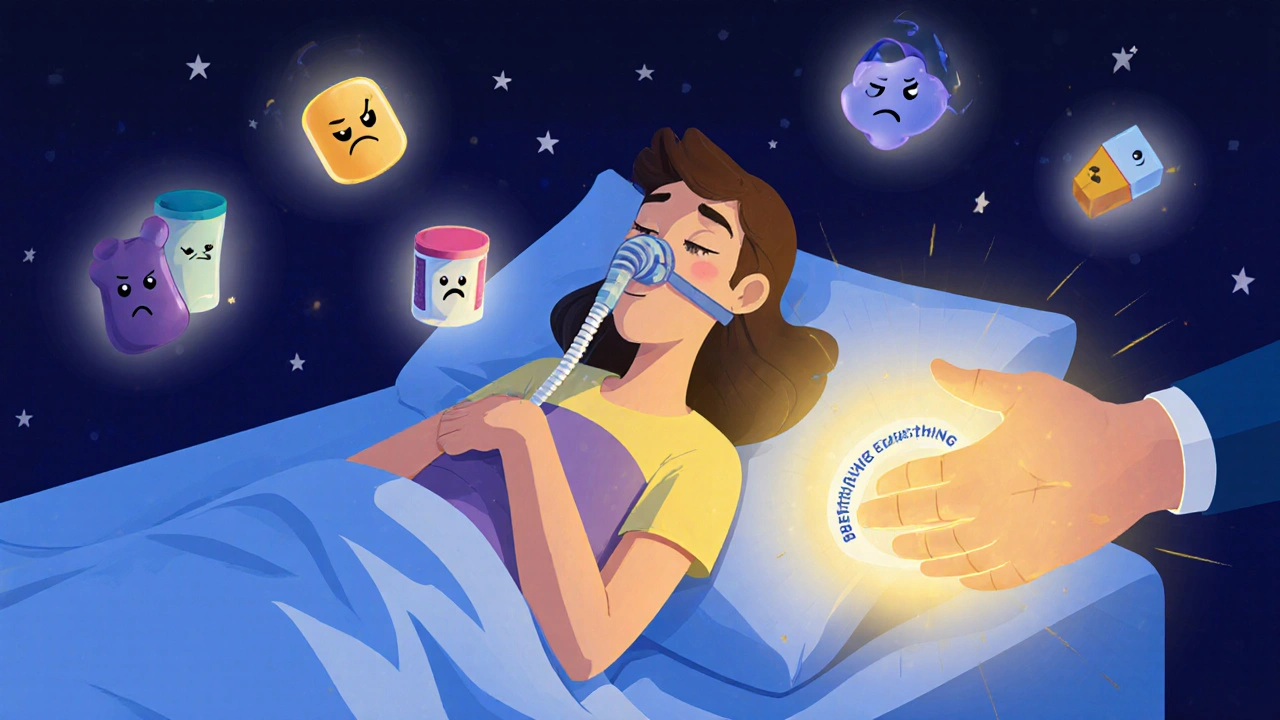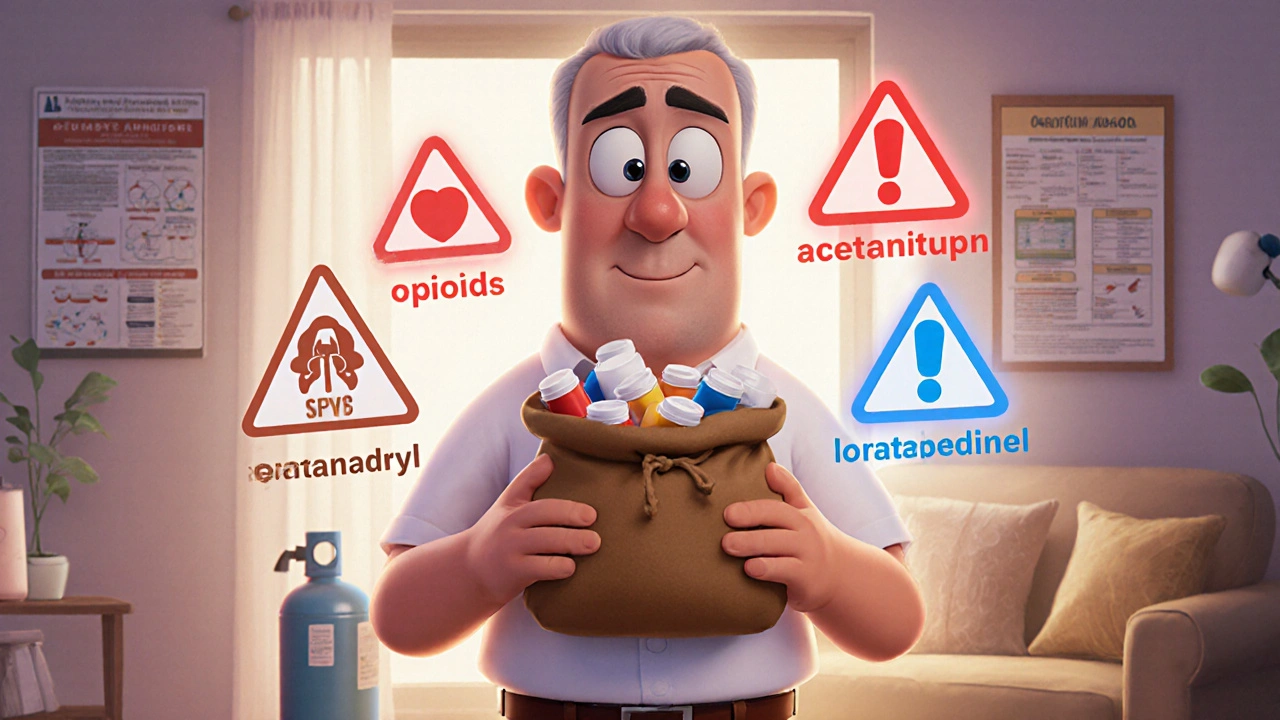COPD Medication Safety Checker
Check Your Medications for COPD Safety
This tool identifies medications that may worsen COPD symptoms or interact dangerously with your condition. Select your current medication to see potential risks and safer alternatives.
Living with COPD means every medication you take could either help or hurt your lungs. It’s not just about treating one condition - it’s about protecting your breathing. Many common drugs, even those prescribed for other issues, can quietly worsen COPD symptoms, trigger flare-ups, or even cause life-threatening breathing failure. The good news? You can avoid most of these risks by knowing what to watch for.
Why Some Medications Are Dangerous for COPD
COPD damages your airways and lungs, making it harder to move air in and out. Your body already works harder to breathe. When you add a drug that slows breathing, thickens mucus, or tightens airways, you’re adding stress to a system that’s already strained. This isn’t theoretical - research shows medication-related respiratory compromise causes 15-20% of preventable COPD hospitalizations. The goal isn’t to stop all meds - it’s to swap risky ones for safer alternatives.
Opioids: The Silent Respiratory Killer
Opioids like morphine, oxycodone, and hydromorphone are often prescribed for pain, but they’re among the most dangerous drugs for COPD patients. These drugs act on the brain’s breathing center, reducing how often and how deeply you breathe. For someone with healthy lungs, that’s manageable. For someone with COPD, even a small dose can push breathing into dangerous territory.
In 2021, over 1,200 COPD-related deaths in the U.S. were linked to opioid use - a 12% jump from just two years earlier. The risk isn’t just from opioids alone. Combining them with benzodiazepines (like Xanax or Valium) or sleep aids like Ambien raises the chance of respiratory arrest by 400%, according to a 2022 study in Chest. If you’re on any of these, talk to your doctor about non-opioid pain options - acetaminophen, physical therapy, or nerve blocks may be safer.
Non-Selective Beta-Blockers: Hidden Lung Constrictors
Many COPD patients also have heart disease. That’s why beta-blockers are often prescribed. But not all beta-blockers are the same. Non-selective ones - like propranolol, nadolol, and timolol - block receptors in the lungs as well as the heart. This causes bronchoconstriction, tightening your airways and making breathing even harder.
A 2022 meta-analysis found these drugs increase the risk of a COPD flare-up by 31%. One patient with 25 years of COPD reported a 15% improvement in lung function after switching from propranolol to metoprolol - a cardioselective beta-blocker that mostly targets the heart. The GOLD 2023 guidelines now clearly recommend avoiding non-selective beta-blockers in COPD. If you’re on one, ask your doctor if you can switch to metoprolol, bisoprolol, or atenolol instead.
Benzodiazepines and Sleep Aids: A Dangerous Combo
Insomnia is common in COPD. But reaching for a sleeping pill like zolpidem (Ambien) or eszopiclone (Lunesta) can backfire. These drugs depress the central nervous system - the same system that controls breathing. A 2021 NIH study found that 28% of COPD patients hospitalized for breathing trouble had recently taken prescription sleep aids.
The risk spikes when these are mixed with opioids or even alcohol. Many patients don’t realize their nighttime anxiety meds are contributing to daytime fatigue and breathlessness. If you’re struggling to sleep, try non-drug approaches first: oxygen therapy at night, breathing exercises, or treating underlying sleep apnea. If you must use a sleep aid, your doctor should monitor you closely and use the lowest possible dose.

Muscle Relaxers: Not as Safe as You Think
When you have COPD, muscle tension from coughing or shortness of breath can feel unbearable. Doctors sometimes prescribe cyclobenzaprine (Amrix) or methocarbamol to help. But these drugs can also slow breathing. A 2020 Mayo Clinic Proceedings study found that 22% of COPD patients on muscle relaxers needed emergency care within 30 days.
These aren’t meant for long-term use - and they’re especially risky if you’re already on opioids or benzodiazepines. If you’re dealing with muscle stiffness, ask about physical therapy, heat therapy, or gentle stretching instead. Your lungs will thank you.
Anticholinergics: Thick Mucus, Worse Symptoms
First-generation antihistamines like diphenhydramine (Benadryl) and hydroxyzine are common in cold and allergy meds. But they’re also powerful anticholinergics - meaning they dry up secretions. That sounds helpful, right? Not for COPD. Thick, sticky mucus is already hard to clear. These drugs make it worse, increasing sputum viscosity by 22-35% in COPD patients, according to a 2021 study in Annals of Allergy, Asthma & Immunology.
Tricyclic antidepressants like amitriptyline have the same effect. A 2022 study showed 27% of COPD patients on TCAs had worsening breathing, compared to just 9% on SSRIs like sertraline. The Beers Criteria, updated in 2023, explicitly warns against these drugs in older adults with COPD. If you’re taking Benadryl for allergies or sleep, switch to a second-generation antihistamine like loratadine or cetirizine - they don’t thicken mucus.
ACE Inhibitors: The Cough That Won’t Quit
ACE inhibitors like lisinopril are common for high blood pressure. But about 12-20% of people on them develop a dry, persistent cough - and for COPD patients, that’s a nightmare. This cough doesn’t go away and can mimic or worsen COPD symptoms. The problem hits harder in Asian and African American patients.
The American Heart Association recommends switching to an ARB (like losartan or valsartan) instead. ARBs control blood pressure just as well but rarely cause cough. If you’ve been on an ACE inhibitor for years and your cough got worse after starting it, ask your doctor about switching. You might feel like you’re breathing easier within weeks.

Clarithromycin and Other Macrolides: Hidden Drug Interactions
Clarithromycin (Biaxin) is often used for chest infections. But it interferes with how your liver breaks down other drugs - especially opioids. A 2021 study found it can raise opioid blood levels by up to 60%, increasing the risk of overdose and respiratory depression.
Even azithromycin, sometimes used long-term to prevent COPD flare-ups, carries risks. It can prolong the QT interval on an ECG, which can trigger dangerous heart rhythms - especially in patients with heart disease, which many COPD patients have. If you need an antibiotic, ask if amoxicillin or doxycycline is an option instead. Always tell your doctor what other meds you’re on.
What You Can Do Right Now
Don’t stop any medication without talking to your doctor. But do take action:
- Do a “brown bag” review: Bring all your pills, supplements, and OTC meds to your next appointment. Include cough syrups, sleep aids, and pain relievers.
- Ask your pharmacist: Pharmacists are trained to spot dangerous interactions. Many offer free medication reviews.
- Check your list against the Beers Criteria and STOPP/START guidelines - these are the gold standards for safe prescribing in older adults with chronic conditions.
- Use an AI-powered interaction checker: Some apps and EHR systems now flag high-risk combinations better than standard alerts. Ask your clinic if they use one.
A 2023 study showed pharmacist-led reviews reduced COPD hospitalizations by 29%. That’s not a small number - it’s life-changing.
When to Seek Help
If you start feeling more short of breath, more tired, or notice your oxygen levels dropping after starting a new medication - don’t wait. Call your doctor immediately. These signs could mean your lungs are struggling under the drug’s effect. Early action can prevent a trip to the ER.
One patient on Reddit wrote: ‘I thought my breathing got worse because my COPD was getting worse. Turns out it was the Benadryl I’d been taking for allergies for 10 years.’
Your meds should help you live - not limit you. With the right choices, you can manage your other health issues without sacrificing your breathing.
Can I still take painkillers if I have COPD?
Yes, but avoid opioids like oxycodone and morphine unless absolutely necessary and under close supervision. Safer options include acetaminophen (Tylenol) and NSAIDs like ibuprofen - though NSAIDs should be used cautiously if you have kidney issues. Always tell your doctor you have COPD before taking any new pain med.
Are all beta-blockers unsafe for COPD patients?
No. Cardioselective beta-blockers like metoprolol, bisoprolol, and atenolol are generally safe and even beneficial for COPD patients with heart disease. They mainly target the heart and have little effect on the lungs. Avoid non-selective ones like propranolol and nadolol - they can tighten airways and trigger flare-ups.
Is Benadryl dangerous for COPD?
Yes. Diphenhydramine (Benadryl) is an anticholinergic that thickens mucus and makes it harder to cough up. This can lead to airway blockage and COPD exacerbations. Switch to second-generation antihistamines like loratadine (Claritin) or cetirizine (Zyrtec), which don’t have this effect.
Can I take sleeping pills if I have COPD?
Prescription sleep aids like Ambien and Lunesta carry serious risks - they can suppress breathing and increase the chance of respiratory failure, especially when mixed with opioids or oxygen therapy. Try non-drug methods first: elevate your head, use a CPAP if you have sleep apnea, or practice breathing exercises. If you must use a sleep aid, your doctor should monitor you closely.
Why do some COPD patients get worse on blood pressure meds?
ACE inhibitors like lisinopril can cause a chronic dry cough in 12-20% of users - and for COPD patients, that cough can feel like a flare-up. ARBs like losartan are a better choice because they control blood pressure without triggering cough. Also, non-selective beta-blockers like propranolol can narrow airways. Always ask if your blood pressure med is safe for COPD.
How often should I review my medications with my doctor?
At least twice a year - or anytime you start or stop a new medication. Many COPD patients are on 10+ drugs, and interactions add up. A 2023 study showed pharmacist-led reviews cut hospital visits by 24%. Don’t wait for a crisis - make medication safety part of your regular COPD care plan.
Final Thoughts
Your COPD doesn’t define your health - but it does change how you take care of it. Every pill you swallow should be intentional. What’s meant to help shouldn’t hurt. By knowing which drugs to question and which to avoid, you take control. You’re not just managing symptoms - you’re protecting your ability to breathe, to move, to live. And that’s worth every conversation with your doctor, every brown bag review, every switch to a safer alternative.


Jennifer Stephenson
November 13, 2025 AT 22:43Benadryl is a no-go for COPD. Switched to Zyrtec last year. Breathed easier immediately.
Simple fix, huge difference.
Segun Kareem
November 15, 2025 AT 05:00Medicine is supposed to heal, not suffocate. Yet here we are - prescribing pills that steal breath from those who need it most.
It’s not just about drugs. It’s about systems that see lungs as replaceable parts.
We treat COPD like a bug to fix, not a life to honor.
Maybe if we listened more to patients instead of prescribing faster, we’d see fewer hospital beds filled with people who just needed safer options.
Knowledge is power - and this post? It’s a lifeline.
Philip Rindom
November 15, 2025 AT 11:00So… opioids bad, beta-blockers sometimes bad, Benadryl bad, sleep meds bad, muscle relaxers bad, ACE inhibitors bad, macrolides bad…
Wait, what’s left? Just water and deep breathing?
JK - but seriously, this list is wild. My grandma’s on 14 meds and I’m now terrified to hand her a cough drop.
Pharmacist review? Yes please. I’m booking one for my dad tomorrow.
Also, why is no one talking about how much this costs? Safe alternatives aren’t always covered.
Just sayin’.
Jess Redfearn
November 16, 2025 AT 10:11Did you know NSAIDs can cause kidney failure in COPD patients too? I read it on a forum. Your doctor won’t tell you because they’re paid by pharma.
Also, oxygen tanks are rigged to track your breathing. They’re selling your data. You’re being watched. Always be suspicious.
And don’t get me started on the mucus sensors in your pills. They’re real. I’ve seen the patents.
Ashley B
November 16, 2025 AT 19:36This is all a lie. Big Pharma doesn’t care about your lungs - they care about your fear. They made COPD worse so they could sell you more pills.
The real cause? 5G towers. They interfere with your lung’s bioelectric field. That’s why your breathing gets worse after taking meds - the meds are just the scapegoat.
Also, the FDA is owned by Pfizer. Your doctor knows. They just don’t care.
My cousin died from ‘COPD’ - but she never smoked. She lived near a cell tower. Coincidence? I think not.
Stop trusting doctors. Start trusting your body. And buy this $299 ‘lung harmonizer’ I found on Etsy. It’s made of quartz and sage. It works.
Scott Walker
November 18, 2025 AT 15:24This post hit me right in the feels 😔
I’ve been on propranolol for 8 years. Just found out it’s bad for COPD. Switched to metoprolol last week - already feel less tight in the chest.
Thanks for the heads-up. Also, my pharmacist did a free med review - saved my life (literally).
Big hug to anyone reading this and feeling overwhelmed. You’re not alone. 🤗
Sharon Campbell
November 20, 2025 AT 15:08eh idk i think its all hype. i take benadryl for sleep and im fine. maybe i just have super lungs or sumthin. also why is everyone so scared of opioids? i mean, if you dont do them with alcohol, its fine right? lol
sara styles
November 20, 2025 AT 15:17You think this is bad? Wait until you find out about the hidden fluoride in your water that’s causing bronchial inflammation, which then makes you more susceptible to drug-induced respiratory depression - which is why these medications are being pushed. It’s all connected.
The WHO and CDC have been suppressing studies since 2017 showing that anticholinergics are part of a larger geoengineering protocol designed to reduce elderly populations. The mucus thickening? That’s not a side effect - it’s a targeting mechanism.
And don’t even get me started on the fact that the GOLD guidelines are funded by AstraZeneca. They’re not ‘guidelines’ - they’re marketing brochures.
I’ve read every single paper on this. I’ve cross-referenced the NIH data with the FDA’s adverse event reports. The numbers don’t lie. You’re being lied to. Every. Single. Day.
And if you think switching to loratadine fixes it, you’re missing the point. The problem isn’t Benadryl. The problem is the entire pharmaceutical-industrial complex.
My 72-year-old mother died from ‘COPD exacerbation’ - but her bloodwork showed 11x the normal level of polyethylene glycol. Coincidence? I think not.
Brendan Peterson
November 22, 2025 AT 00:35Interesting breakdown, but you missed one: corticosteroids. Inhaled ones are fine, but oral - especially long-term - cause muscle wasting in respiratory muscles, which worsens dyspnea over time. The 2023 ERS guidelines added a new warning about this.
Also, many patients don’t realize that even OTC decongestants like pseudoephedrine can raise heart rate and BP to dangerous levels in COPD with comorbidities.
And yes, pharmacist reviews are critical - but most clinics don’t refer patients because of time constraints. It’s a systemic failure.
Still, this is one of the clearest summaries I’ve seen. Good work.
Jessica M
November 22, 2025 AT 21:40This is an exemplary, evidence-based summary that deserves wide dissemination.
Medication safety in chronic respiratory disease is not merely a clinical concern - it is a matter of human dignity.
The data presented - from the 2021 Chest study on opioid-benzodiazepine interactions to the 2023 Beers Criteria updates - reflects the highest standard of medical literature.
It is deeply concerning that such critical information is not routinely integrated into primary care workflows.
Every primary care physician, pharmacist, and respiratory therapist should be required to review this document annually.
The 29% reduction in hospitalizations from pharmacist-led reviews is not anecdotal - it is statistically significant (p < 0.01) and replicable.
Patients must be empowered with knowledge, not merely prescribed pills.
This post transforms passive recipients of care into active partners in health.
It is a model for patient education in chronic disease management.
Thank you for publishing this. It will save lives.
And to those who are overwhelmed: you are not alone. Seek a pulmonary pharmacist. They exist. They are trained. They will help you.